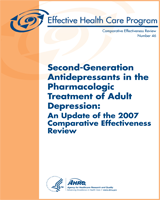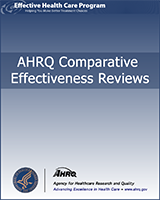NCBI Bookshelf. A service of the National Library of Medicine, National Institutes of Health.
This publication is provided for historical reference only and the information may be out of date.
Excerpt
This report summarizes the available evidence on the comparative efficacy, effectiveness, and harms of 12 second-generation antidepressants: bupropion, citalopram, duloxetine, escitalopram, fluoxetine, fluvoxamine, mirtazapine, nefazodone, paroxetine, sertraline, trazodone, and venlafaxine in treating patients with MDD, dysthymia, and subsyndromal depression. It also evaluates the comparative efficacy and effectiveness for maintaining remission and for treating accompanying symptoms such as anxiety, insomnia, or neurovegetative symptoms.
Contents
- Preface
- Acknowledgments
- Executive Summary
- 1. Introduction
- 2. Methods
- 3. Results
- Overview of All Key Questions
- Key Question 1: Efficacy or effectiveness in treating depressive disorders and symptoms
- Key Question 2: Efficacy or effectiveness for maintaining remission or for treating patients with unresponsive or recurrent disease
- Key Question 3: Efficacy or effectiveness for treating symptoms accompanying depression
- Key Question 4: Comparative harms and adherence for second-generation antidepressants
- Key Question 5: Efficacy, effectiveness, and harms for selected populations
- 4. Discussion
- Appendixes
- Appendix A Peer Reviewers
- Appendix B Search Strategy
- Appendix C Excluded Studies
- Appendix D Evidence Tables
- Appendix E Characteristics of Studies with Poor Internal Validity
- Appendix F Placebo Studies Included in Meta-Regression
- Appendix G Placebo Studies Excluded from Meta-Regression
- Appendix H Meta-analyses of Discontinuation Rates
- Appendix I Publications Appearing Only as Abstracts
- Appendix J Acknowledgments
- References
Prepared for: Agency for Healthcare Research and Quality, U.S. Department of Health and Human Services.1 Contract No. 290-02-0016. Prepared by: RTI International-University of North Carolina Evidence-based Practice Center.
Suggested citation:
Gartlehner G, Hansen RA, Thieda P, DeVeaugh-Geiss AM, Gaynes BN, Krebs EE, Lux LJ, Morgan LC, Shumate JA, Monroe LG, Lohr KN. Comparative Effectiveness of Second-Generation Antidepressants in the Pharmacologic Treatment of Adult Depression. Comparative Effectiveness Review No. 7. (Prepared by RTI International-University of North Carolina Evidence-based Practice Center under Contract No. 290-02-0016.) Rockville, MD: Agency for Healthcare Research and Quality. January 2007. Available at: http://effectivehealthcare.ahrq.gov/healthInfo.cfm?infotype=all&reptype=allfinal.
This report is based on research conducted by the RTI International-University of North Carolina Evidence-based Practice Center (EPC) under contract to the Agency for Healthcare Research and Quality (AHRQ), Rockville, MD (Contract No. 290-02-0016). The findings and conclusions in this document are those of the author(s), who are responsible for its contents; the findings and conclusions do not necessarily represent the views of AHRQ. Therefore, no statement in this report should be construed as an official position of the Agency for Healthcare Research and Quality or of the U.S. Department of Health and Human Services.
This report is intended as a reference and not as a substitute for clinical judgment. Anyone who makes decisions concerning the provision of clinical care should consider this report in the same way as any medical reference and in conjunction with all other pertinent information.
This report may be used, in whole or in part, as the basis for development of clinical practice guidelines and other quality enhancement tools, or as a basis for reimbursement and coverage policies. AHRQ or U.S. Department of Health and Human Services endorsement of such derivative products may not be stated or implied.
None of the investigators has any affiliations or financial involvement that conflicts with the material presented in this report.
- 1
540 Gaither Road, Rockville, MD 20850. www
.ahrq.gov
- Comparative Effectiveness of Second-Generation Antidepressants in the Pharmacolo...Comparative Effectiveness of Second-Generation Antidepressants in the Pharmacologic Treatment of Adult Depression
Your browsing activity is empty.
Activity recording is turned off.
See more...

